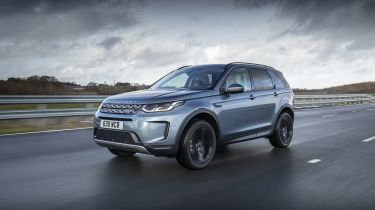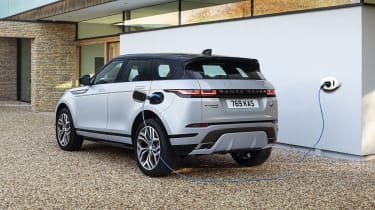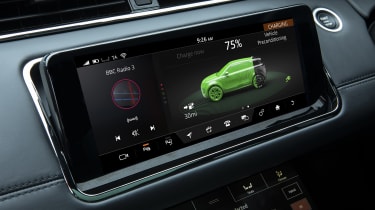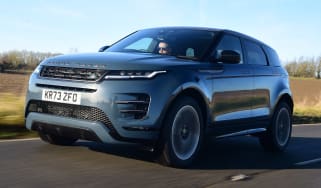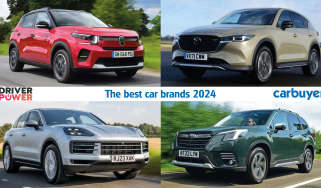Land Rover Discovery Sport and Range Rover Evoque PHEVs launched
Land Rover launches two competitively priced plug-in hybrid SUVs
- New PHEVs promise up to 201.8mpg
- Priced similarly to rest of range
- Almost every Evoque and Discovery Sport engine now electrified
The Land Rover Discovery Sport and Range Rover Evoque line-ups have been bolstered by two new plug-in hybrid (PHEV) models. Almost indistinguishable from the petrol and diesel models, the PHEVs offer both performance and economy (providing you keep the battery fully charged), but aren’t much more expensive than non-hybrid versions.
Both cars are available to order now, with prices starting from £43,850 for the Evoque and £45,370 for the Discovery Sport. They rival other premium plug-in hybrid SUVs like the BMW X5 xDrive30e, Audi Q5 TFSI e, Mercedes GLC 300 e and Volvo XC60 T6 Recharge. The hybrid powertrain can be chosen on most trim levels for both cars.
Badged P300e, the Discovery Sport and Evoque PHEVs combine a 197bhp 1.5-litre petrol engine with a 108bhp electric motor, with the latter mounted on the rear axle to give all-wheel drive. With the two power sources working together, launching from 0-62mph takes just 6.4 and 6.6 seconds in the Evoque and Discovery respectively. Top speed on electric power alone is 84mph.
Land Rover claims fuel economy figures of 175.5mpg (Discovery) and 201.8mpg (Evoque), but this should be taken with a pinch of salt as it completely depends on where you drive, how far you go and how often you recharge the batteries. With a full charge, you’ll be able to manage pure electric running of up to 38 miles in the Discovery or 41 miles in the Evoque.
Plug-in hybrids are a popular choice with company-car drivers, and we expect it’ll be a similar story here; CO2 emissions are quoted at just 32g/km, so business drivers will pay just 7% Benefit-in-Kind (BiK) on the Evoque and 11% on the Discovery from this month. Due to the cars costing more than £40,000, private buyers will need to pay £465 in VED (road tax) per year until their car is six years old.
Using a 32kW DC public charger, the battery can be topped up from 0-80% in around half an hour, while using a 7kW wallbox allows the battery to be recharged at home in under an hour and a half. Charging with a standard three-pin plug, meanwhile, takes over six and a half hours. You can choose from electric-only, petrol-only or combination driving modes, and the cars can even use GPS and navigation data to work out the best time to use the engine or the motor.
Land Rover also offers a smartphone app with which owners can check battery charge, schedule when charging starts (to take advantage of cheaper electricity tariffs) and preset the car’s climate control before a journey.
Unusually, boot space isn’t affected by the addition of an electric motor and battery packs, but the Discovery Sport PHEV is five-seat only, with most other models allowing you to choose seven seats. Boot space stands at a huge 897 litres in the Discovery with the seats up and 1,794 litres with the seats down, while the smaller Evoque offers 591 or 1,383 litres respectively.
Besides entry-level D150 models, all other engines in the Evoque and Discovery Sport ranges feature mild-hybrid technology to reduce fuel consumption and emissions.
What does it mean for car buyers?
Plug-in hybrids can often be much more expensive than the same car with petrol or diesel engines, but Land Rover has priced the Evoque and Discovery Sport PHEVs relatively close to some of the other conventional options. This means it suits both private and business drivers, although you’ll need to charge the battery regularly to take advantage of the potential fuel savings. As they don’t command a big premium, these two plug-in models could convince more buyers to drive an electrified vehicle.
Read all our Land Rover reviews here.
Recommended
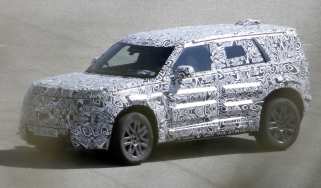
New Land Rover Defender Sport spotted and it’s an electric baby SUV
Most Popular

New Smart #5 Brabus is a 637bhp far cry from the brand’s city car past

Best car leasing deals 2025: this week’s top PCH offers
Tips & advice

Car dashboard warning lights: what does each symbol mean?

Electric car charging stations: public networks, charger types, apps and maps


